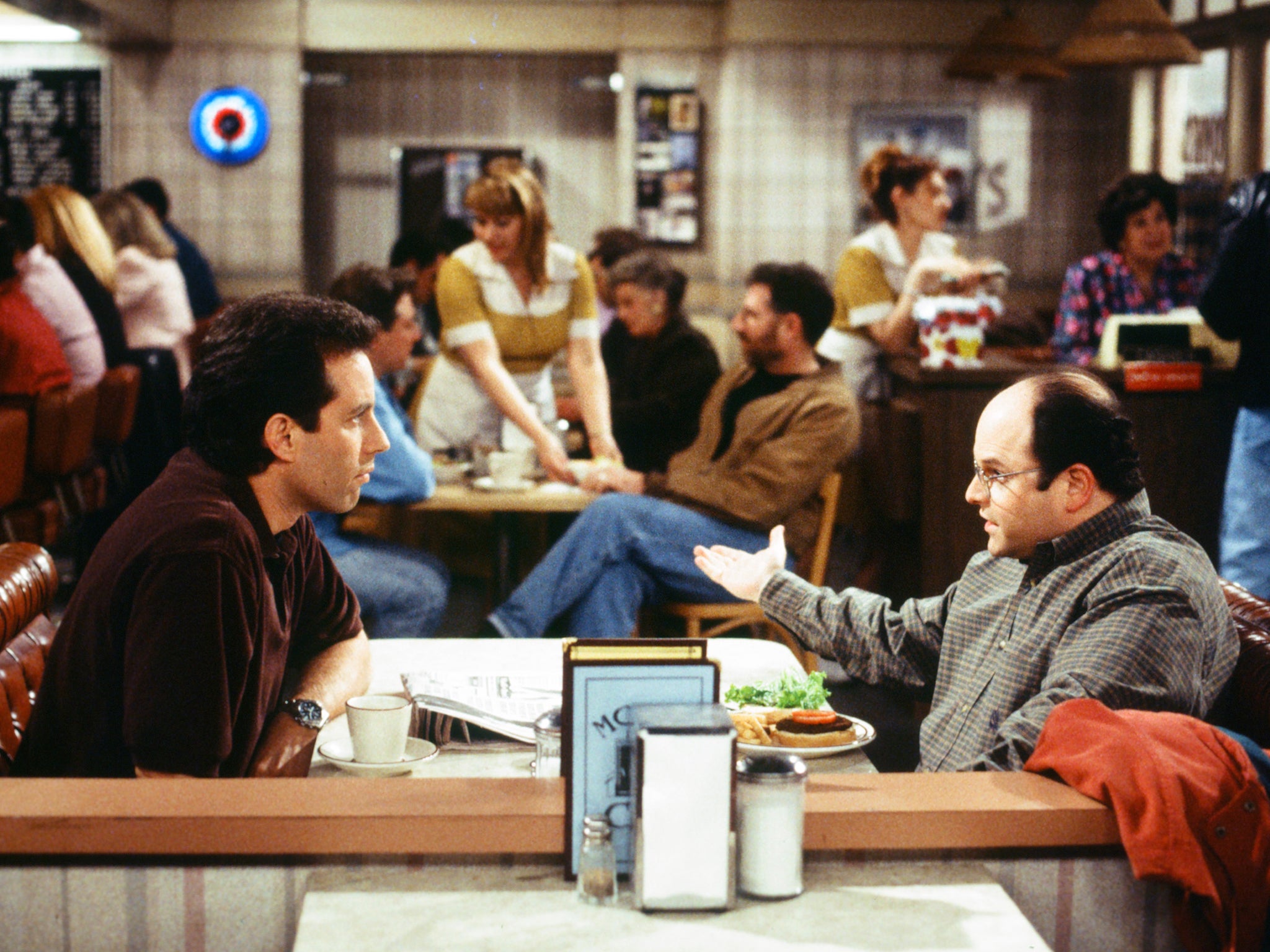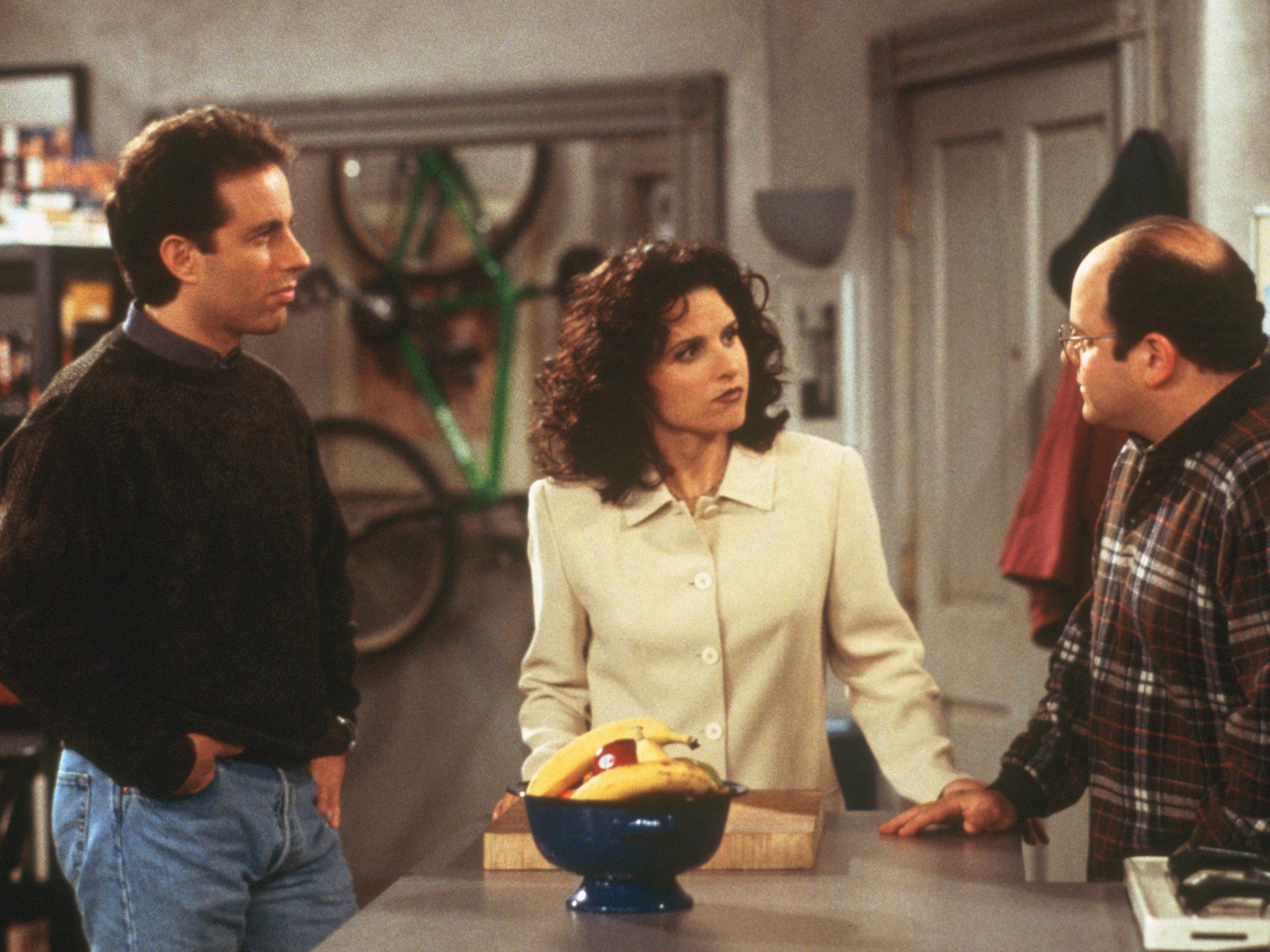Seinfeld at 30: The 'show about nothing' that was really about everything
Exploits of Jerry, George, Elaine and Kramer as popular as ever three decades on from pilot episode's first airing

When Democratic senator Michael Bennet announced his intention to seek the party’s nomination for the US presidency earlier this year, Republican rival Ted Cruz wasted no time in deriding his decision to join an already overcrowded field.
“Michael Bennet’s campaign is a Seinfeld campaign – about nothing – that typifies the Left’s empty rage in 2020,” the Texan jeered on Twitter.
Bennet found an unlikely defender in actor Jason Alexander, who played George Costanza in the hit sitcom, which celebrates its 30th anniversary on 5 July.
“So Senator Ted Cruz has called Senator Bennet a ‘Seinfeld campaign’, claiming it’s about nothing. I’ve met Bennet. He is a great man and real choice for POTUS. As for Cruz – the jerk store called and they’re running out of you. I say, the faster the better,” Alexander responded.
The insult to Cruz was a direct reference to a line from “The Comeback”, a vintage episode from season eight.
Alexander knew his followers would be in on the joke because, three decades after Seinfeld first aired on NBC, the show’s hold over the American popular imagination remains as tight as ever.
Episodes like “The Library”, “The Junior Mint”, “The Contest”, “The Puffy Shirt”, “The Opposite”, “The Bubble Boy”, “The John Cheever Letters” and “The Soup Nazi” have long since been recognised as all-time greats, while their many cherished exchanges and interludes are endlessly parroted and pored over by cultish devotees.
If anything, Seinfeld's influence has only grown in the years since its final episode aired on 14 May 1998.
While you might have expected the show's naff slap bass theme and dubious sartorial choices to deter a new generation of viewers, Jerry’s high-top trainers and the bowling shirts worn by his nuisance neighbour Kramer (Michael Richards) are back in fashion, and the programme itself has demonstrated a peculiar staying power, its best observations timeless enough to be applied to much more recent phenomena.
Donald Trump’s Twitter rants, for example, have been routinely likened to “the Airing of the Grievances”, an annual custom introduced by George’s father Frank (Jerry Stiller) – a fellow Queens native – as part of his alternative Christmas celebration Festivus in “The Strike”.
On the same platform, the Seinfeld Current Day account imagines the sitcom’s continuation into the smartphone era and has accumulated more than a quarter of a million followers by imposing Jerry’s trademark commentary onto everything from airpods to Kim Kardashian’s thwarted Kimono lingerie line. Seinpop on Instagram takes the gag even further down the rabbit hole.
Conceived by star Jerry Seinfeld and show runner Larry David, Seinfeld represented the next evolutionary step onwards from Woody Allen’s New York Jewish comedy of neurosis and revolved around its eponymous hero, a modestly successful stand-up comedian close to Jerry’s own persona.
Seinfeld spends his days on the show loafing around his Upper West Side apartment or the nearby Monk’s Diner in the company of friends George, Elaine (Julia Louis-Dreyfus) and Kramer, the quartet pouring over the minutiae of social niceties, small points of principle and the petty squabbles that arise from their respective dating disasters, job interviews and other run-ins with the general public.
And that was all they did. For nine series and 180 episodes.
Larry David’s mantra of “no hugging, no learning”, a slogan worn on T-shirts by the production crew during filming to hammer home the message, meant the gang never progressed as people, never resolved their hang-ups, succumbed to saccharine morals, became kinder, more sophisticated or less self-involved. They just were. As idle, hampered and clueless as the rest of us.
As Ted Cruz alluded to, Seinfeld prided itself on being “the show about nothing”, famously devoting whole episodes to everyday occurrences in which nothing happened.

In season two’s “The Chinese Restaurant”, an instalment worthy of Samuel Beckett, the group waited in vain for a table to become available for the entire duration of its running time, the characters repeatedly reassured by the maître d’ they will only have to hang on for another “five to 10 minutes” while resisting the urge to pinch a fellow patron’s egg roll out of spite.
In “The Parking Garage”, they wandered hopelessly around a New Jersey shopping mall’s multi-storey searching for the car no one could remember where they had left, Kramer lugging a bargain air-conditioning unit, Elaine worrying the goldfish she’s just bought wouldn’t survive the ordeal.
Seinfeld was, of course, really the show about everything, trading in universals of human behaviour, the annoyances we all feel every single day in attempting to adhere to the social contract and its many sub-clauses, loopholes and inconsistencies.
“You know we’re living in a society!” George yells at a stranger with Brezhnev eyebrows at the airport who refuses to tell him the time, despite having an expensive watch clearly visible on his wrist.
Costanza’s explosive temper and occasional grasping outbursts of ambition are as relatable as his cheapskate cowardice. Only George (David’s fictional counterpart) could kill a woman by economising, but that’s exactly what he does when his fiancée Susan (Heidi Swedberg) expires as a result of licking cheap envelope glue while sealing their wedding invitations.
“This woman hates me so much, I’m starting to like her,” he says of a masseuse who takes against him, speaking volumes about our darkest lusts.

Kramer’s bohemian pursuit of pleasure, by contrast, is vicariously thrilling.
There’s something stirring about his refusal to accept Jerry’s contention that the purchase of fruit at a grocery store is always a gamble, as he does in “The Ex-Girlfriend”. We are swept up in Kramer’s indignation that the peach he has just bought is “sub-par” and must be returned, a stance that sees him barred by the shopkeeper concerned.
"They don't have a decent piece of fruit at the supermarket. The apples are mealy, the oranges are dry... I don't know what's going on with the papayas!" he wails at the universe.
This wild man – who once designed a coffee table book about coffee tables that folds out into a miniature coffee table – is as attractive to us for his total liberation from embarrassment as he is to the Latvian Orthodox nun who is so powerless to resist his “kavorka” or animal lure in “The Conversion” she loses her faith.
Jerry’s preoccupations with Cheerios, personal hygiene and Superman are entirely his own but also speak to the man-child refusenik in many of us, while Elaine is his counterpoint, there to point out his superficialities before exposing herself as a hypocrite.
Though Elaine is seemingly the most successful and independent member of the tribe with a career in publishing, her relationships end for exactly the same sort of trivial, nit-picking reasons as Jerry’s. Neither is able to break the pattern of their behaviour or is particularly invested in trying.
To suggest Seinfeld was the product of some great masterplan would be a mistake, however. Its star and producer had no intention of making a grand, misanthropic pronouncement about the state of modern America mores.
They were simply commissioned to write a sitcom in the manner of a Taxi (1978-83) or a Cheers (1982-93) to capitalise on Jerry’s glowing celebrity – as Garry Shandling had before them – and did so hiring the best talent they could, gradually honing the characters they had based on real people of their own acquaintance to suit the formidable comedic talents of Alexander, Dreyfus and Richards.
Plotting hailed as ground-breaking, like the very meta, self-referential season four arc in which Jerry and George are given the chance to write their own autobiographical comedy series, was undertaken because the creators thought it was a funny idea and trusted their instincts, as well as those of their enviable writing team, Larry Charles and Peter Mehlman among them.
Without Seinfeld there would have been no Friends (1994-2004), let alone Curb Your Enthusiasm (2000-), Comedians in Cars Getting Coffee (2012-) or Veep (2012-). Its influence cannot be overstated but nor should its pleasures go under reported.
Think of its gallery of magnificent supporting characters like Newman (Wayne Knight), Detective Bookman (Philip Baker Hall) or Uncle Leo (Len Lesser). Or the moment George returns to work on Monday morning having been fired the previous Friday, pretending it never happened and gambling on no one bothering to challenge him.
“Was that wrong?” he asks when harangued by another boss for sleeping with the office cleaning lady. The pause Alexander leaves before delivering this line is the stuff dreams are made of.
Join our commenting forum
Join thought-provoking conversations, follow other Independent readers and see their replies
0Comments